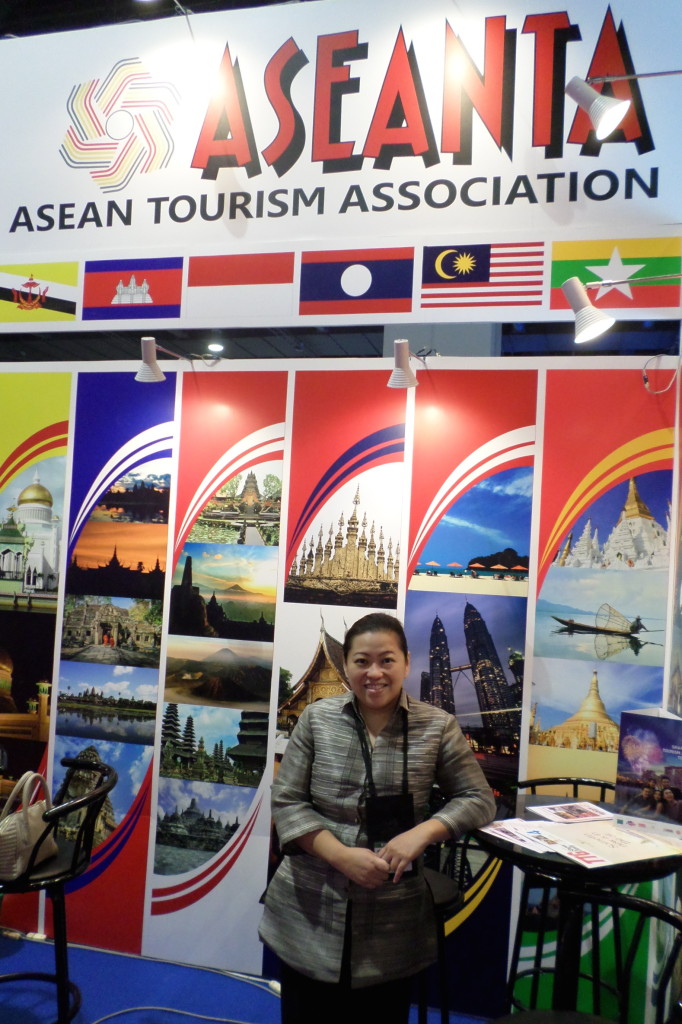
26 Jan, 2016
ASEANTA’s female President tells tourism ministers: Replace “war on terrorism” with “Peace Through Tourism”
Manila — ASEAN’s tourism industry needs to become a conduit for conflict prevention and replace antagonistic terminology such as “war on terrorism” with a more pacifist slogan, “Peace Through Tourism,” according to the President of the 10-country grouping’s umbrella travel federation.
In a statement at the ASEAN Tourism Forum, held in Manila between Jan 18-22, Ms Aileen Clemente, President of the ASEAN Tourism Association (ASEANTA) also called for ASEAN tourism ministers to focus equally on the broader objectives of ASEAN’s Socio-Cultural and Political-Security Blueprints, as much as the Economic Blueprint.
 Ms Aileen Clemente |
Her call was backed by Thai Minister of Tourism and Sports Mrs Kobkarn Wattanavrangkul who told the closing ATF media conference that “building friendship is more important than (growing the) figures.”
It is the first time that two women leaders of ASEAN travel & tourism have publicly cited the bigger picture of global events which influence where and how people travel. Their comments reflect growing global concerns that the ASEAN’s rich mosaic of culture and heritage which travel & tourism considers as assets could become liabilities if manipulated for nefarious reasons by extremists and politicians of all ilks.
Ms Clemente’s call is even more significant as it comes from a 40-year-old female, one of the few women heading a pan-regional travel industry association. It fits in perfectly with the findings of a UN report (Click here for report) which called for a greater role of women in conflict-prevention.
Her family pedigree strengthens the status of her comment. One of the region’s NextGen leaders, she is the youngest daughter of Jose Clemente, founder of Rajah Travel & Tours, a prominent Philippines travel corporation. The senior Mr. Clemente, who passed away in 2001, was also closely involved with ASEANTA for many years in the 1980s.
ASEANTA is an umbrella federation of the national associations of hotels, airlines and travel agencies and tour operators of the 10 ASEAN countries. Cumulatively, its membership includes thousands of companies employing hundreds of thousands of people ASEAN-wide.
The ASEAN Tourism Ministers and heads of NTOs meetings both include an agenda item in which ASEANTA is provided an opportunity to report on its activities and discuss any ideas or recommendations.
In her separate presentations at the two meetings, Ms Clemente’s common message was to outline the restructuring and reinvention of ASEANTA and pitch for a stronger marketing and research partnership with the public sector.
But she raised the ante in her statement to the tourism ministers.
She said, “We have seen that almost everywhere in the world, there has been a declaration on war on terrorism. Even as we understand what this means, the phrase itself seems to show antagonism. Instead of war on terrorism, ASEANTA would rather go the route of peace through tourism.
“While terrorism is a global issue, the important fact is that we in ASEAN remain united in forging relations with our neighbors with diverse religion and culture. That is why it always overwhelms me to sit in the ASEANTA meetings as this is a true testimony that diversity is embraced.”
She said that although the theme for the ATF 2016 is One Community For Sustainability, “the lack of this is what we see as one of the underlying (reasons) why terrorism has grown. There has been a lack of what I call life security, lack of understanding and appreciation of culture, as well as desire for singular power.
“The word community is already for me a strong and impactful word – that we think of each other. And together with sustainability, it sends a powerful message of oneness, and is probably the best formula for peace.”
Ms Clemente is also taking her appeal directly to the travel industry at large.
In her “Message from the President” published in the ASEANTA brochure distributed at the ATF, Ms Clemente wrote, “We (ASEAN) are the testimony of solidarity and good relations as we all belong to a melting pot of culture and races as well as diverse religions. And yet, we sit on the same table talking about the betterment of the region and of the tourism industry.
“In this age of fear and threats of terrorism, tourism plays an indispensable role to ensure that there is a better understanding of people. It is vital that we continue to work together hand in hand towards peace through tourism.”
In a subsequent interview, Ms Clemente said, “We want ministers to become conduits for peace building and conflict prevention. We are telling them to focus on not just the Economic Blueprint of the ASEAN integration process but also the Socio-Cultural and Political-Security blueprints. All this can be done in just one action.”
Ms Clemente said this is the first time she has pressed this point at a public tourism gathering and planned to filter it down to each national association so that it may then be taken up by their grassroots memberships. “These are small steps but hopefully they will have a big impact.”
She added, “Our actions don’t have to necessarily to state the position of the governments. We are promoting tourism, which benefits cultures. So there is nothing to oppose.”
Asked in the final closing ministerial press conference to comment on Ms Clemente’s call, Thailand’s Minister of Tourism and Sports endorsed it. Emphasising the importance of building an ASEAN identity in order to promote the objectives of ASEAN integration, Mrs Kobkarn Wattanavrangkul said, “Building friendship is more important than (growing the) figures.”



Liked this article? Share it!